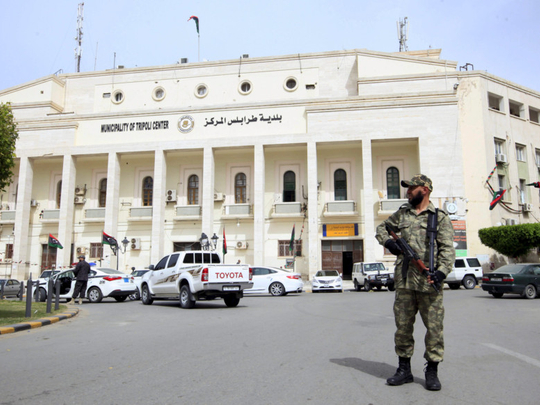
Tripoli: Libya’s UN-backed unity government moved to cement control over the country’s finances and institutions on Wednesday after the rival administration in Tripoli ceded power in a boost to efforts to end years of chaos.
The concession late on Tuesday by the militia-backed administration that had controlled Tripoli since 2014 was a major about-turn for a body that had made every effort to block the arrival of prime minister-designate Fayez Al Sarraj.
It came after UN envoy Martin Kobler held talks with Al Sarraj at the naval base where he has established his headquarters since his arrival under escort by sea last Wednesday.
The international community has pleaded with Libya’s warring sides to unite behind the unity government, which it sees as vital to tackling a terrorist expansion and rampant people smuggling in the North African state.
The Government of National Accord has yet to secure a similar concession from another rival administration based in the far eastern town of Tobruk, which has long claimed international legitimacy because it was appointed by the parliament elected in the last polls in 2014.
In a directive published on its official Facebook page early on Wednesday, the GNA ordered all government “ministries and institutions and committees” to respect its authority and use its logo.
It also ordered the Central Bank and the Audit Bureau to freeze all state accounts immediately, except for salary payments to government employees.
The Tripoli-based administration said it was stepping aside in the national interest.
“We inform you that we are ceasing the activities entrusted to us as an executive power,” it said in a statement.
The statement, bearing the logo of the so-called National Salvation Government headed by Khalifa Ghweil, said the unrecognised Tripoli prime minister, his deputy premiers and cabinet ministers were all stepping aside.
It said the Tripoli authorities took the decision to quit because they were determined to “preserve the higher interests of the country and prevent bloodshed and divisions.”
The UN Libya envoy, in Tripoli on his first visit since Al Sarraj’s arrival, hailed the announcement as “good news” but added that “deeds must follow words”.
Kobler praised the “courage and determination” of the unity government, whose growing authority has raised hopes it will be able to restore some stability in Libya, which has been plagued by chaos since Muammar Gaddafi’s 2011 overthrow.
“We want to show that the UN and the international community support Prime Minister Al Sarraj and members of the presidency council,” Kobler said.
He said the UN was ready to provide “all the support needed” towards an “immediate and peaceful handover of power”.
Kobler, a German diplomat appointed last year to spearhead international efforts to resolve the Libya conflict, was seen walking Tuesday in the streets of Tripoli’s Old City, chatting with patrons in cafes and stopping for people to take selfies with him.
The unity government was formed under a power-sharing deal agreed by some lawmakers in December.
The new administration has been broadening its support, winning the backing of the Libyan Investment Authority, the National Oil Corporation and the Central Bank.
The GNA has faced opposition from hardliners in both the east and west, and has yet to win formal approval from the internationally recognised parliament now based in the east.
But it is being protected by some of the key armed brigades in the capital and has been working with the Tripoli-based National Oil Corporation and central bank to chart an economic recovery.
Earlier on Tuesday, nearly 70 members of the GNC held a session in Tripoli where they voted to formally adopt the UN-backed deal.
They said they were forming a body called the State Council, which the UN-backed agreement envisages as a higher chamber made up of former GNC members.
It was not clear the move would have any legal impact, given the absence of many GNC members and the fact the eastern parliament has not formally endorsed the deal or the GNA.
A minority of GNC members who oppose the UN-mediated deal also met, and declared the declaration of the rival GNC grouping to be “illegal”.
Mattia Toaldo, a policy fellow at the European Council on Foreign Relations, said Kobler’s visit was a clear signal that the Government of National Accord (GNA) was putting down roots in the capital.
“Kobler’s visit to Tripoli, after the many times he was refused landing and access ... shows the degree of control of Tripoli by the GNA,” Toaldo said.
An adviser to Kobler said the UN envoy discussed with Al Sarraj “ways to support the action” of the unity government.
Western governments are deeply concerned that Libya’s disarray has allowed the Daesh terror group to gain an important foothold in the country, but have said a foreign intervention can only take place at the request of a unity government.











